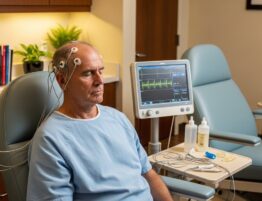The call of the mountains is stronger than ever. From the Rockies to the Himalayas, high-altitude hiking draws adventurers seeking breathtaking views and physical challenges.
But beneath the thrill lies a hidden danger. It’s the impact of extreme elevations on the brain. Reduced oxygen at high altitudes can trigger serious neurological effects. They range from mild discomfort to life-threatening conditions. Symptoms like dizziness and headaches aren’t just inconveniences — they can signal serious brain stress.
Hikers, especially those new to high altitudes or with pre-existing health conditions, are at risk. Understanding these dangers is crucial for safe exploration.
In this article, we will explore why altitude affects the brain. We will focus on the symptoms to watch for and how to protect yourself on the trail.
Why Altitude Impacts Brain Function
When you climb to high altitudes, the air gets thinner, and oxygen levels drop. Your brain, which uses about 20% of the body’s oxygen, feels this change acutely. Think of it like a car engine running on low fuel — it sputters and struggles. This condition is called hypoxia, which starves nerve cells of the oxygen they need to function. Without enough oxygen, brain cells can’t communicate properly, leading to confusion, slowed thinking, or worse.
Even fit hikers aren’t immune; a marathon runner’s strong lungs don’t guarantee protection against altitude’s effects. The brain’s sensitivity to oxygen shortages varies from person to person. It’s influenced by genetics, health, and prior altitude experience.
This is where acclimatization comes in. By gradually exposing your body to higher elevations, you give your brain time to adapt. It boosts your body’s ability to use limited oxygen more efficiently. Without this adaptation, even a short hike above 8,000 feet can impair brain function, making preparation essential.
Mountain Sickness: What Happens in the Brain
Acute mountain sickness (AMS) is a common but serious condition. It’s triggered by low oxygen and pressure at high altitudes. It’s not just about feeling tired; AMS directly affects the brain. It causes neurological symptoms like headaches, confusion, and balance problems.
These arise because the brain, sensing oxygen scarcity, may swell slightly or accumulate fluid. It’s a process that can escalate to cerebral edema in severe cases.
This swelling puts pressure on delicate brain tissue, disrupting normal brain function. Headaches from AMS are distinct. They are often throbbing and intensified by movement, accompanied by nausea or fatigue.
Confusion clouds judgment, making navigation and decision-making difficult. Balance issues may cause stumbling, increasing the risk of falls on rugged terrain.
AMS typically strikes within 6 to 24 hours of reaching altitudes above 10,000 feet. It affects up to half of hikers. The severity depends on ascent speed, altitude, and individual susceptibility.
Ignoring mountain sickness can lead to high-altitude cerebral edema (HACE). It’s a rare but life-threatening condition requiring immediate descent. Early recognition is critical. Symptoms like persistent headaches or disorientation demand action.
Resting, hydrating, and descending 1,000 to 2,000 feet can often reverse mild AMS. Understanding what’s happening in your brain empowers you to respond swiftly. It can prevent minor symptoms from becoming major emergencies.
Dizziness and Headaches: Early Warning Signs
Among the first signs of brain stress at high altitudes are dizziness and headaches. Dizziness feels like a spinning sensation or lightheadedness. It’s often striking when you stand up quickly or turn your head. It’s a clue that your brain isn’t getting enough oxygen to keep balance and coordination. Headaches, meanwhile, are the most common complaint. They affect nearly all hikers with AMS. They’re typically worse in the morning or after lying down because fluid shifts in the brain increase pressure.
Other warning signs include nausea, vomiting, or extreme fatigue. These aren’t just annoyances — they’re your body’s way of saying it’s struggling. If dizziness or headaches persist despite rest, hydration, or over-the-counter pain relief, it’s time to act. Descend immediately to a lower altitude, ideally 1,000 to 2,000 feet. It can ease the strain on your brain. Seek medical attention if signs worsen or if you notice confusion, slurred speech, or difficulty walking. These could indicate high-altitude cerebral edema (HACE). It’s a rare but life-threatening condition requiring urgent care.
The Role of Acclimatization in Brain Protection
Acclimatization is your brain’s best defense against altitude’s challenges. It’s the process of letting your body adjust to lower oxygen levels over time. When done right, it helps your brain and body work more efficiently. It reduces the risk of neural symptoms. Acclimatization typically takes 1 to 3 days per 3,000 feet of elevation gain above 8,000 feet. However, it varies by individual.
Here are practical steps to acclimatize safely:
- Climb gradually. Avoid jumping from sea level to 10,000 feet in one day. Spend a night or two at intermediate elevations. For example, at elevations around 5,000 or 7,000 feet to ease the transition.
- Take rest days. After gaining 3,000 feet, spend a full day hiking at that altitude before ascending further. This allows your brain and body time to adapt to the lower oxygen levels. It reduces the risk of altitude sickness and improves safety and performance.
- Stay hydrated. Dehydration worsens altitude symptoms. Drink 3 to 4 liters of water daily, even if you don’t feel thirsty.
- Avoid alcohol and sedatives. These can depress breathing, which lowers oxygen intake and puts stress on the brain.
- Consider medications. Drugs like acetazolamide (Diamox) can speed acclimatization by helping your body adjust to low oxygen levels. But consult a doctor before use.
By following these steps, you reduce the strain on your brain. This will make your hike safer and more enjoyable.
Long-Term Neurological Risks of Repeated Exposure
A single high-altitude hike may cause temporary symptoms. However, frequent or extreme exposure raises concerns about long-term neurological risks. Researchers are studying how repeated hypoxia from high-altitude activities might affect the brain over time. Some evidence suggests that chronic exposure could lead to subtle changes in:
- Memory
- Attention
- Processing speed
For example, mountaineers who’ve summited peaks like Everest multiple times have reported persistent ‘brain fog’ or difficulty concentrating.
In rare cases, extreme altitude exposure may cause micro-injuries to nerve cells. It can potentially increase the risk of conditions like early cognitive decline. Studies on high-altitude climbers show mixed results. Some find no lasting damage. Meanwhile, others note minor brain changes on imaging scans. Experts agree that more research is needed. However, the possibility of cumulative harm is a reason to take precautions. Hikers who frequently tackle peaks above 12,000 feet or spend weeks at extreme altitudes should monitor their cognitive health.
Smart Hiking: How to Stay Safe and Aware
Protecting your brain during high-altitude hiking requires planning and awareness. By taking proactive steps, you can reduce neurological risks and enjoy the mountains safely.
Here’s a checklist to guide you:
- Monitor symptoms. Keep a mental note of headaches, dizziness, or confusion. Use a journal to track when they start and how severe they are.
- Know your limits. If you’re new to high altitudes or have health conditions like migraines or lung issues, consult a doctor before hiking above 8,000 feet.
- Carry portable oxygen. Small canisters of supplemental oxygen can relieve mild symptoms and buy time to descend. Learn how to use them before your trip.
- Descend when needed. If symptoms like severe headache or confusion don’t improve within a few hours, go down 1,000 to 2,000 feet immediately.
- Use a pulse oximeter. This device measures blood oxygen levels. It helps you gauge how your body is coping, and you should aim for readings above 90%.
- Buddy up. Hike with a partner who can spot signs of mountain sickness or other issues you might miss.
- Consult a neurologist. If you experience persistent symptoms like memory problems or balance issues after a hike, see a specialist to rule out lasting damage.
Technology can also help. Apps like AltitudeAlert can warn you when you’re climbing too fast, and GPS devices ensure you don’t get lost if confusion sets in. Above all, prioritize brain health as much as physical stamina. The mountains will always be there – your brain’s resilience might not.
High-altitude hiking is a thrilling way to connect with nature, but it comes with hidden risks to your brain. Symptoms like dizziness, headaches, and mountain sickness are warning signs that shouldn’t be ignored. Through proper acclimatization, careful planning, and quick action, you can reduce the immediate dangers of low oxygen levels and protect against potential long-term neurological risks. By hiking smart, you’ll not only conquer peaks but also safeguard the most vital organ you carry on the trail – your brain.
Don’t let high-altitude hiking put your brain at risk! Our neurological clinic specializes in assessing and protecting your brain health both before and after your adventures. From personalized altitude risk evaluations to post-hike neurological screenings, we’ve got you covered. Book a consultation today to hike smarter. Stay safe and safeguard your brain for every trail ahead.












I've given up... the stress her office staff has put me through is just not worth it. You can do so much better, please clean house, either change out your office staff, or find a way for them to be more efficient please. You have to do something. This is not how you want to run your practice. It leaves a very bad impression on your business.
Please, leave your review
Write a comment: